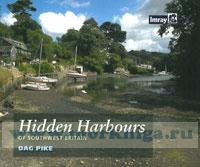Сб с 10 до 16
Hidden Harbours of Southwest Britain Скрытые гавани Юго-Западной Англии
It is not easy to find a definition of a hidden harbour. Each harbour in this book has its own definition, partly depending on history, partly depending on its current status and use and partly depending on how interesting it might be for a visitor. What was intriguing in researching this book was just how many hidden harbours there are around the coast. Some have fallen into disuse and are hardly recognisable as harbours anymore and have almost disappeared off the map, some have changed their use from commercial to leisure craft whilst others have a very different function to that for which they were originally constructed, perhaps being originally developed as fishing ports and now focusing on the tourist trade. What is apparent is that they all have a rich history where they may have been developed and then declined only to rise again or where they may be slowing sliding into oblivion. Some have been preserved for future generations and some were once amongst the major ports of Britain whilst
others have played only a minor part in the commerce of the country.
Many of these hidden harbours in southwest Britain can trace their origins to the Roman invasion. The Romans arrived by boat and did much of their exploration of the country by boat establishing harbours as they went. The Romans were after the minerals such as lead, silver and antimony that were found, particularly in Cornwall but today there are very few traces of the Roman influence any longer and fishing and trade became the main reason for ports to exist. The demand for port facilities grew rapidly in the 17th and 18th centuries when coal took over from wood as a main source of fuel and products such as farm produce, bricks and minerals started to move around the country but it was primarily the mineral exploitation in Cornwall that was responsible for much of the port development.
At the time road transport was still in the horse and cart era and the railways had not been invented so the transport of anything that was heavy or bulky had to go by water if possible. To reduce the overland journey to a minimum ports were established as close to the mines and quarries as possible and it was this that lead to the development and building of what today are many of the hidden harbours featured in this book. Some of these harbours, particularly those on the north coast of Devon and Cornwall were built in what would now be considered to be impossible situations, having little regard to the strength and violence of the sea. This optimism that man could challenge the might of the Atlantic storms demonstrates how important it was to establish harbours as close to the source of mines and quarries as possible and even when harbours were washed away in a storm they were often rebuilt again and again.
Contents
Introduction
Seaton, Lyme Bay
Sidmoutb, Lyme Bay
Budleigb Salterton, Lyme Bay
Tuckenhay, River Dart
Hope Cove, Bigbury Bay
Bantham, Bigbury Bay
Noss Mayo, River Yealm
Weir Quay, River Lamar
Gunnislake, River Lamar
Lreluggan, River Lynher
St Germans
Portwrinkle, Wbitsand Bay
Lostwitbiel, River Fowey
Pont, River Fowey
Pentewan, Mevagissey Bay
Devoran, River Lai
Port Navas, Helford River
Lrelowarren, Helford River
Gillan Creek, Lalmouth Bay
Porthoustock, Lalmouth Bay
Lamorna Cove, Mounts Bay
Priest's Cove, Cape Cornwall
Portreath, North Cornwall
Lrevaunance Cove, St Agnes
Wadebridge, River Camel
Port Quin, North Cornwall
Port Gaverne, North Cornwall
Hartland Quay, Hartland Point
Bucks Mill, Barnstaple Bay
Braunton, Barnstaple Bay
Watermouth Bay, Bristol Channel
Combwich, River Parrett
Bridgwater, River Parrett
Uphill, Weston Bay
Oldbury on Severn

 Белый треугольник
Белый треугольник  Стартовать, чтобы побеждать
Стартовать, чтобы побеждать